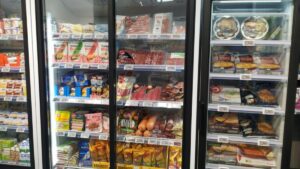
In the first half of 2024, the National Health Service of Ukraine (NHSU) will conduct scheduled monitoring of 63 contracted healthcare facilities.
According to the agency on its website, the list of medical institutions to be monitored was determined based on the results of calculating a system of indicators that can confirm or refute the existence of risks in the work of clinics.
The monitoring will be conducted in medical facilities contracted under the packages “Medical Care for Acute Cerebral Stroke”, “Medical Care for Acute Myocardial Infarction”, “Medical Care during Childbirth”, and “Medical Care for Newborns in Complicated Neonatal Cases”.
In particular, the monitoring will be conducted in 16 clinics contracted for the acute cerebral stroke package, 11 clinics contracted for the acute myocardial infarction package, 28 medical institutions contracted for the maternity care package, and eight clinics contracted for the neonatal care package.
In addition, the NHSU informs that the list of medical institutions to be monitored will be supplemented by institutions that have a rehabilitation contract.

Data from all of the capital’s air quality monitoring points have been included in the “Kyiv Digital” application, said Kyiv Mayor Vitali Klitschko.
“I will note that Kyiv continues to strengthen control over the state of atmospheric air. After all, military actions and shelling caused fires in the suburbs, from which the air condition on some days was unsatisfactory,” Klitschko stressed.
According to him, five stationary complexes of European standard are already working in the capital, carefully examining the quality of the air on about 10 indicators. It is also planned to add to them the measurement of the radiation background.
Kyiv plans to install three more stationary points of observation in Desniansky, Holosiyivsky and Sviatoshynsky districts in 2022.
There are also more than 40 indicative air monitoring stations in the capital, supplementing the data from the main stations.

The State Service for Food Safety and Consumer Protection has started to monitor prices daily for a number of socially important food products, medical products and fuel, according to the website of the Cabinet of Ministers of Ukraine on Wednesday.
“State supervision (control) during martial law in Ukraine will be carried out only to curb the rise in prices for socially significant products, guaranteeing their availability to the population and in the presence of a threat that has a significant negative impact on the rights, legitimate interests, life and health of a person,” the government said.
The list of food products for monitoring includes wheat flour, pasta, loaf, bread, buckwheat and oatmeal, pork, beef, poultry (chicken carcasses), milk, butter and sunflower oil, sour cream, chicken eggs, crystalline sugar, white cabbage, onions, beets, carrots, potatoes.
From non-food products, the list includes 96% ethanol, anti-inflammatory and antibacterial drugs, A-92 and A-95 gasoline, diesel fuel, liquefied gas for cars.
The Cabinet of Ministers in resolution No. 303 of March 13 stopped conducting state control and market supervision of prices for these goods, introduced in January of this year, however, the State Service for Food Safety and Consumer Protection took up daily monitoring of prices for them from March 22.
“According to the data provided by the monitoring, since March 14, logistics has been established in many enterprises in almost all regions of Ukraine, which improved the situation with the assortment of goods, and also made it possible to reduce prices for the grocery group of goods, bakery products, some dairy clear products, as well as fuel,” the government said in a statement.
In addition, the State Service for Food Safety and Consumer Protection called on businesses to prevent unreasonable price increases for goods with significant social significance for the population during martial law in Ukraine.

Between October 14, 2018 and October 14, 2019, representatives of nationalist and ultra-right organizations committed 137 acts of violence or attacks against property, journalists, politicians, and activists, said sociologist Oksana Dutchak, who helped with the monitoring project, named “Confrontations and Ultra-Right Violence.” sociologist. “From October 14, 2018 to October 14, 2019, 137 cases were recorded. Of these, 48 is a confrontation, 89 is ultra-right-wing violence directed against people or property,” she said during a press conference at the Interfax-Ukraine news agency on Monday.
The monitoring was carried out by the public organization Institute Republiсa with the support of the Rosa Luxemburg Foundation in Ukraine. It was based on materials on acts of violence or confrontation by ultra-right organizations and movements, information about which was published in the media and social networks.
“Over the indicated period, the largest number of acts of violence and confrontation were committed by representatives of the C14 and National Corps organizations. With the participation of C14, 40 cases were recorded, among which 25 violent attacks, 10 of them against people. The National Corps was involved in 30 episodes, 21 – of a violent nature, 15 of them against people,” said the organizer of the monitoring.
According to the monitoring results, the victims of violent actions by nationalists were most often feminist or LGBT activists, politicians and political parties, representatives of state or law enforcement agencies, as well as journalists.
Authors of the study said they think that Ukraine has a systemic problem with far-right violence, which is generated by inaction, and sometimes indulgence of the law enforcement system. They demand law-enforcement agencies conduct a thorough investigation of hate violence, as well as guarantee the rights of citizens to peaceful assembly, freedom of speech and security.

The European Trade Union Confederation is concerned about a lack of social dialogue in Ukraine and will send its monitoring mission to the country, Natalia Zemlianska, Chairman of the All-Ukrainian Trade Union of Production Workers and Entrepreneurs of Ukraine Natalia Zemlianska has said. “On December 17, the European Trade Union Confederation issued a statement expressing very strong concern over a lack of social dialogue in Ukraine,” Zemlianska said at a press conference at Interfax-Ukraine.
According to her, precisely because of the absence of such a dialogue, the parliament passed bills that discriminate against individual entrepreneurs, the Cabinet of Ministers is trying to agree on a new Labor Code, and people are forced to go outside in order to be heard.
“The European Trade Union Confederation is committed, firstly, to raise this issue at the level of the European Commission and the European Parliament, and secondly, it will now organize a mission to Ukraine to monitor the situation on the spot,” the expert stated.